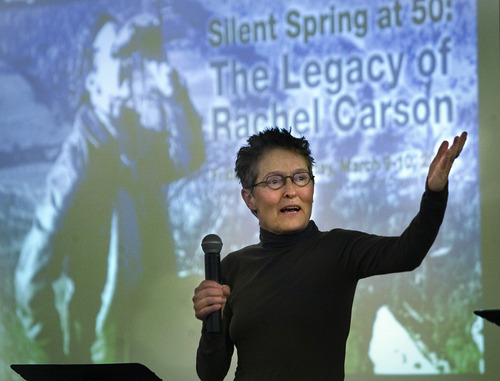This is an archived article that was published on sltrib.com in 2012, and information in the article may be outdated. It is provided only for personal research purposes and may not be reprinted.
Author and scientist Rachel Carson once said that "man's endeavors to control nature by his powers to alter and to destroy would inevitably evolve into a war against himself, a war he would lose unless he came to terms with nature."
That one paragraph summed up the basic message of speakers Saturday on the second day of the 17th annual Stegner Symposium at the University of Utah, which examined the 50th anniversary of the publication of Carson's book, Silent Spring.
The 1962 classic on the dangers of pesticides is often credited with not only the banning of the use of DDT by the federal government but also the establishing of the modern environmental movement and the establishment of the Environmental Protection Agency in 1970.
It also raised questions about the use of scientific research for advocacy, a controversy that still occurs today in discussions over such hot-button issues as climate change.
"Silent Spring changed how we look at the environment," said Ann Neville, senior adviser for biological resources for Kennecott Utah Copper during a panel discussion on Carson's influence. "She was a pioneer because she questioned industry, government and science. ... We learned that today's solution could be tomorrow's problem."
And, because Carson was also one of the nation's first prominent female scientists, her example encouraged more women to study the sciences. In 1936, when Carson was appointed a junior aquatic biologist with the Bureau of Fisheries, she was one of only two women then employed with the bureau at a professional level.
University of Utah philosophy professor Anya Plutynski, in her talk on women in the sciences after Carson, said that women these days have earned 50 percent of the doctorates in biology, but are still underrepresented in more math-intensive scientific disciplines. For example, she said that in the top 50 research universities, women make up 15 percent of tenured faculty.
"Girls are less encouraged to go into math," said Plutynski, who interviewed female scientists at the University of Utah. "There are negative stereotypes about girls and math and science. But if you teach students about stereotypes, you can reduce the threat. ... There are more role models."
Yet as famous as Silent Spring is, how many people have actually read it? Several speakers said they hadn't actually read the book until they learned they would be speaking at the symposium.
"Silent Spring is one of the most famous unread texts in history, along with the Pentagon Papers and The Satanic Verses," said Priscilla Colt Murphy, an editor and teacher who spoke about how the mass media treated the book.
Murphy said that even 50 years later, the debate over the use of pesticides started by Silent Spring rages. She pointed to one editorial written in recent years saying the ban on DDT, which was used to kill mosquitoes carrying malaria, has resulted in the killing of millions of poor, dark-skinned people around the world.
Carson, who wrote a pamphlet on Utah's Bear River Bird Refuge while still working for the U.S. Fish and Wildlife Service, also helped people throughout the country learn about nature in their own backyards by writing government publications.
Lynn de Freitas, executive director of Friends of Great Salt Lake, said more people need to find an interest in places close to home so they can learn about the importance of their relationship with the place they live.
Sarah George, executive director of the Natural History Museum of Utah, said planners of the recently opened museum looked to some of Carson's tenets when developing exhibits. Its mission statement is to illustrate the natural world and the place of humans in it, looking at subjects such as ecology, evolution and sustainability to educate those who visit.
Alan Matheson, senior environmental adviser to Utah Gov. Gary Herbert, said the development of environmental policy is complex and controversial but must be based on the idea that you "can't violate natural laws without consequences."
He said well-meaning government programs can sometimes have unintended consequences.
The symposium was sponsored by the Wallace Stegner Center for Land, Resources and the Environment, whose mission is to promote a sustainable future by advancing informed, collaborative and innovative solutions to critical environmental issues.
Twitter: @tribtomwharton



